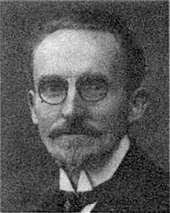Theodor Paeth
Theodor Paeth (born September 8, 1871 in Sageritz , Stolp district , † 1940 in Berlin ) was a German manufacturer and politician ( DNVP ).
Live and act
After attending primary school in Petrol (Stolp district, Pommnern), Paeth received private lessons. He then completed an apprenticeship as a carpenter , which was followed by training as a carpenter and sculptor . He later studied at the School of Applied Arts and Crafts in Hanover and at the teaching institute of the Berlin Museum of Applied Arts . From 1898 to 1910 he lived and worked in Cologne , Hanover and Berlin , where the field of artistic interior design was the focus of his work.
In 1910, Paeth founded his own company for interior design in Berlin, which operated under the address Oranienstraße 185 in Berlin-Kreuzberg as a cabinet maker, workshop for interior design and furniture factory. In 1919 he was elected head master of the Berlin carpenter's guild. In this capacity he founded and organized the United Associations of the Berlin Timber Industry in 1920, which he also chaired. In the same year he became a city councilor in Berlin. In 1921 the Association of German Carpenters' Guilds elected Paeth as its chairman. He also became a member of the administrative committee of the State Labor Office in Berlin.
Paeth was politically active during the Weimar period in the German National People's Party (DNVP). In the Reichstag election of December 1924 , Paeth was elected to the Reichstag , to which he belonged until May 1928 as a representative of constituency 2 (Berlin).
Paeth was also a member of various foreign trade offices and specialist committees, assessor of the Reich Economic Court, the tax court, expert at the price inspection office of the city of Berlin, partner and head of the specialist newspaper for master carpenters and wood industrialists in Germany. Finally, he also presented essays on arts and crafts, commercial and socio-economic content.
Fonts
- Contract regulations for construction work. Explained specialist edition for joiners and joiners . Otto Stollberg Publishing House for Politics and Economics, Berlin 1926.
- The German middle class in town and country expects the rights guaranteed by the constitution. German National Font Distribution Agency, Berlin 1927.
Web links
- Literature by and about Theodor Paeth in the catalog of the German National Library
- Theodor Paeth in the database of members of the Reichstag
Individual evidence
- ↑ Reich address book for the building trade 1929/30 , p. 815 (rubric interior design and spatial art )
| personal data | |
|---|---|
| SURNAME | Paeth, Theodor |
| BRIEF DESCRIPTION | German manufacturer and politician (DNVP), MdR |
| DATE OF BIRTH | September 8, 1871 |
| PLACE OF BIRTH | Sageritz , Stolp district |
| DATE OF DEATH | 1940 |
| Place of death | Berlin |
